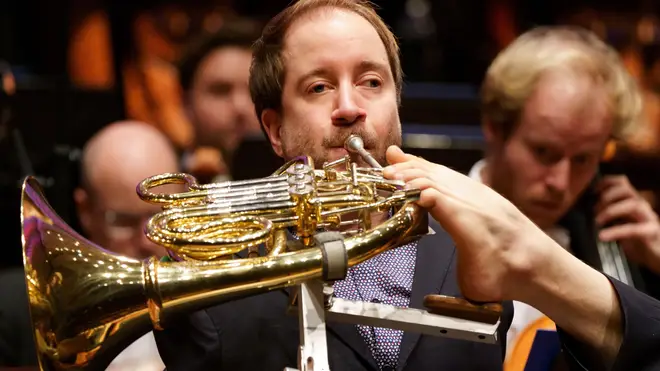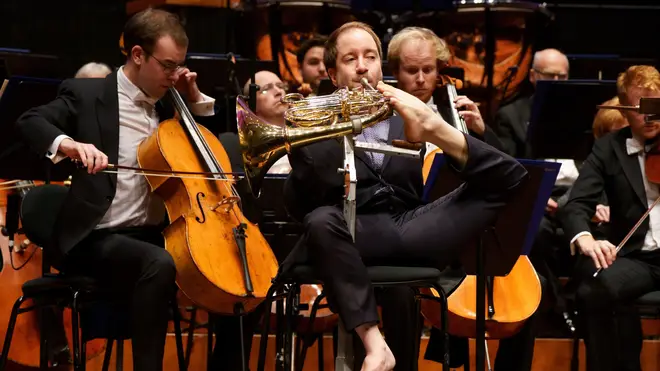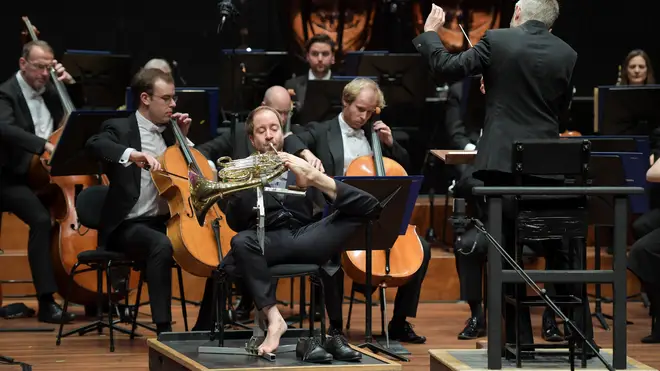On Air Now
Calm Classics with Ritula Shah 10pm - 1am
31 July 2023, 11:59

Introducing the French horn with Felix Klieser | Classic FM
French horn player Felix Klieser is one of today’s leading instrumentalists, who recently finished a two-year residency with the Bournemouth Symphony Orchestra.
Felix Klieser is a German professional hornist of outstanding talent. Klieser began playing the French horn aged four – but under a shadow of doubt from his prospective teachers, who at the outset suggested he might be better suited to the piano or a percussion instrument.
Born without arms, Klieser plays the French horn using his left foot to press the valves and relies mainly on the positioning of his lips to play the instrument.
“I think I’m the one and only person who plays the French horn this way,” Klieser tells Classic FM (watch video above).
“The thing about the French horn is the fingering is not that important. It looks important, but you can also play without fingering a bit.
“It’s not a violin or a piano where fingering is quite important. And so, 85 percent of playing is about your lips, about the air stream, about controlling everything. This is the main thing in playing the French horn – and using the keys is not that difficult, I would say.”
Read more: Lang Lang and Gina Alice play a stunning husband and wife piano duet

Klieser was born into a non-musical family in the small German city of Göttingen, which had one music school and one French horn teacher. He recalls marching into the school and announcing, ‘I want to play the French horn’.
“There was no one around me in my family playing an instrument or making music. And I also hadn’t been to any concerts where I saw the French horn. So, it’s a miracle where I got the idea from to play it,” Klieser says.
“They said, ‘OK, at the age of four you are maybe a little bit too young. You need a lot of air to play this instrument, a lot of energy’. So, they asked me, maybe it would be nice to start with a different instrument at the beginning, maybe piano or percussion…
“But I remember I just wanted to play the French horn. And I said OK, if it’s not possible to learn the French horn, then I will play nothing. And they said, ‘OK, OK, you can start’. And so, I had my first lesson at the age of four.”
When he was 17, Felix enrolled at the Hochschule für Musik und Theater in Hannover, and he has since gone on to develop an international career as a French horn soloist.
In 2013, Felix released his debut album Reveries on Berlin Classics, and the following year he received the ECHO Klassik award for young artist of the year. In 2016, Felix received the prestigious Leonard Bernstein Award of the Schleswig-Holstein Musik Festival.
Read more: Who invented Braille music notation and how does it work?

If you uncoiled a French horn, Klieser says, “you would have a line of nearly four metres”. The instrument can span up to three to four octaves; but, Klieser adds, “The range is a bit of a question of ‘how much do you practice?’!”
There’s also more to the instrument’s repertoire than Mozart horn concertos, Klieser is keen to add.
“Most people when I tell them I play the French horn, don’t know exactly what it is. But when you listen to film music, big movies, then you quite often can hear the sound of a French horn.”
Great film composer John Williams includes the instrument extensively in the Star Wars movies, with memorable horn solos throughout all the instalments – Williams was even once challenged to have a play himself.
“The special thing for me about the French horn, is that it has so many possibilities to play different colours, different sounds,” Klieser continues. “The most beautiful thing for me is to create emotions, to create specific situations just with the colour of the sound.”

In 2021, Klieser took up the role of artist in residence at the Bournemouth Symphony Orchestra, Classic FM’s Orchestra in the South of England, making his UK concerto debut with them.
Throughout the orchestra’s 2021/22 concert season, Klieser worked closely with the great ensemble, playing concertos as well as chamber music.
“It’s so nice to be part of the Bournemouth Symphony Orchestra family for the next few years. Because normally when you play with an orchestra, you travel to the orchestra for one rehearsal and only play one or two concerts, then you leave and do something different,” the hornist says.
“And having a residency for the upcoming two years means you also have the possibility to get more in contact with the members of the orchestra and the audience to do projects and masterclasses off stage – and also to have the chance to play chamber music with members of the orchestra, you wouldn’t [normally] have the opportunity to do this.”
And with chamber music, he adds, “You have the chance to get to know everyone much more [deeply] and develop something bigger than you can do with a rehearsal and a few concerts.”